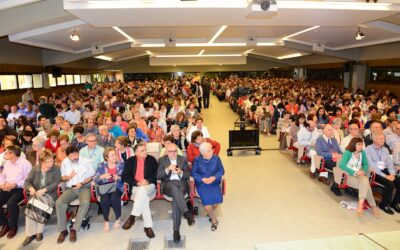 «My company, Tecnodoor, designs and manufactures automatic and manual doors for industrial and civil use in Isera, Italy. I have belonged to the Economy of Communion (EoC) since 1994, basing the company on this new way of doing business: renewing relationships, maximizing collaboration at all levels, both internally among staff and members and outside with clientele. The current economic crisis affected us precisely at the point which is the life and stability of the company: loans. After a careful evaluation of defaults, we decided on countermeasures to bring things back into balance, trying out new strategies to recover our debts. Over the years we had done honest work, but mostly we had built faith with our customers. What were we to do now in order not to ruin these relationships, by asking them to settle their debts? One night I just couldn’t sleep, so many thoughts were running through my mind. The basic question was: how should an entrepreneur like me act who wants to remain consistent with the EoC Project, when it comes to recovering legitimate claims? I thought about what the key points were that I should never let go of. Little by little a mode of operation began to become clear to my mind: a) manage “credit recovery” not as if it were my own thing, but as an assignment I’ve been given; b) don’t break relationships, but try to strengthen them; c) listen fully to the suffering that the other company or the customer is experiencing; d) objectively explain the “suffering” of our own company and the possible consequences.
«My company, Tecnodoor, designs and manufactures automatic and manual doors for industrial and civil use in Isera, Italy. I have belonged to the Economy of Communion (EoC) since 1994, basing the company on this new way of doing business: renewing relationships, maximizing collaboration at all levels, both internally among staff and members and outside with clientele. The current economic crisis affected us precisely at the point which is the life and stability of the company: loans. After a careful evaluation of defaults, we decided on countermeasures to bring things back into balance, trying out new strategies to recover our debts. Over the years we had done honest work, but mostly we had built faith with our customers. What were we to do now in order not to ruin these relationships, by asking them to settle their debts? One night I just couldn’t sleep, so many thoughts were running through my mind. The basic question was: how should an entrepreneur like me act who wants to remain consistent with the EoC Project, when it comes to recovering legitimate claims? I thought about what the key points were that I should never let go of. Little by little a mode of operation began to become clear to my mind: a) manage “credit recovery” not as if it were my own thing, but as an assignment I’ve been given; b) don’t break relationships, but try to strengthen them; c) listen fully to the suffering that the other company or the customer is experiencing; d) objectively explain the “suffering” of our own company and the possible consequences.  After that sleepless night I wanted to give my reflections a try. With a heart as much as possible detached from the not so easy task, and believing that every neighbour – whether creditor, employer or supplier – was a brother or sister, I began. I listened deeply on the phone or during personal meetings. The result was that we began to receive payments in whole or by instalments. But the most important thing is that we never severed or even damaged any relationships, but strengthened everyone’s personal confidence and trust in us». By Pietro Comper Source: EoC Insert Città Nuova n.13/14 – 2013
After that sleepless night I wanted to give my reflections a try. With a heart as much as possible detached from the not so easy task, and believing that every neighbour – whether creditor, employer or supplier – was a brother or sister, I began. I listened deeply on the phone or during personal meetings. The result was that we began to receive payments in whole or by instalments. But the most important thing is that we never severed or even damaged any relationships, but strengthened everyone’s personal confidence and trust in us». By Pietro Comper Source: EoC Insert Città Nuova n.13/14 – 2013
Help each other in every way
Help each other in every way




0 Comments